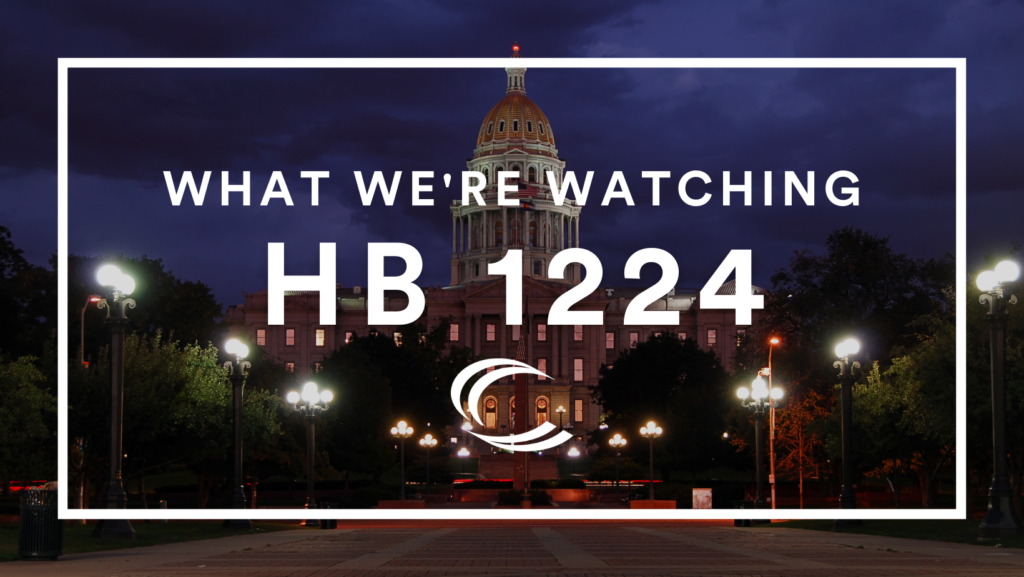In this Capitol Report:
What We’re Watching: HB 1224
This week we’re watching House Bill 1224, which makes several updates to the state’s “Colorado Option” health insurance plan passed in 2021. The Colorado Chamber’s Health Care Policy Council voted today to oppose the bill, which is up for its first committee hearing in the House tomorrow, March 10.
The original public option legislation, HB 21-1232, required insurers to offer a specific, state-regulated plan to the small group and individual markets. The Colorado Chamber opposed the bill on the basis that this model would inevitably lead to cost-shifting in the market, increasing premiums for employer-sponsored plans that cover the majority of Coloradans.
While the 2021 law is still in its early phases of implementation, recent reports show that Colorado’s health insurance premium rate increases were the second-highest in the nation from 2022 and 2023, with a 19.6% increase year-over-year. This is compares to a nationwide increase of about 4%. Some health industry executives have speculated that this could be due to some of the “unintended consequences” of the Colorado Option.
As reported in the Sopris Sun in February, “[T]he intention behind Colorado’s public option is to require insurance companies — UnitedHealthcare, Rocky Mountain Health Plans and Anthem, locally — to provide plans with lower premiums, yet more offerings. ‘In that, there was some cost shifting that went on, so I think that had an impact on it as well,’ McDowell stated.”
HB 1224 takes a number of steps to broaden the authority of the Colorado Division of Insurance (DOI) over standardized plans offered on the Colorado health benefit exchange. It allows DOI to establish limits on a carrier’s administrative costs and profits for standardized plans. It also requires that the exchange platform prioritizes plans in a way that would give strong preference to Colorado option plans. Members of the Chamber’s Health Care Council are concerned that this bill could be unfairly applied by de-prioritizing private plans on the exchange.
In addition, the bill would adjust the DOI review window for Colorado Option rates from 60 days to 120 days. Since Colorado Option rates are not separate from other rate filings under the Affordable Care Act, this provision would double the review period for all rate filings. Chamber members are concerned about this timeline – the current 60-day practice is already challenging, and doubling the window will increase administrative costs.
HB 1224 will be heard in the House Health and Insurance Committee tomorrow.
Denver Mayoral Election Brings More Debate on Public Safety & Homelessness
This week, Ed Sealover, Editor of The Sum & Substance VP of Strategic Initiatives for the Colorado Chamber, moderated a panel discussion on key issues that are facing Denver voters including public safety, workforce & homelessness. Panelists included Common Sense Institute fellows Mitch Morrissey, Tamra Ryan and Chris Lifari as well as Chris Brown, VP of Policy & Research during the Common Sense Institute’s Eggs & the Economy event.
To listen to the discussion a link to the recording can be found here.
Ed Sealover has moderated several Denver Mayoral debates during the last two months, and more are likely to come as the race comes down to Election Day on April 4th.
Health Care Council takes Positions on Legislation
The week the Colorado Chamber’s Health Care Council met and took positions on several pieces of legislation. Our guest speaker was Representative Andrew Boesenecker (D-Fort Collins). Rep. Boesenecker outlined his goals and intentions for HB23-1209, Analyze Statewide Publicly Financed Healthcare. The council and Representative Boesenecker engaged in a thoughtful conversation regarding the future of Colorado’s healthcare system.
Below are the proposed bills, the Colorado Chamber took a position on.
HB 1215– Limits on Hospital Facility Fees [Oppose]
HB 1201 – Prescription Drug Benefits Contract Term Requirements [Oppose]
HB 1209– Analyze Statewide Publicly Financed Healthcare [Oppose]
HB 1224– Standardized Healthcare Plans [Oppose]
HB 1225– Extend and Modify Prescription Drug Affordability Board [Oppose]


